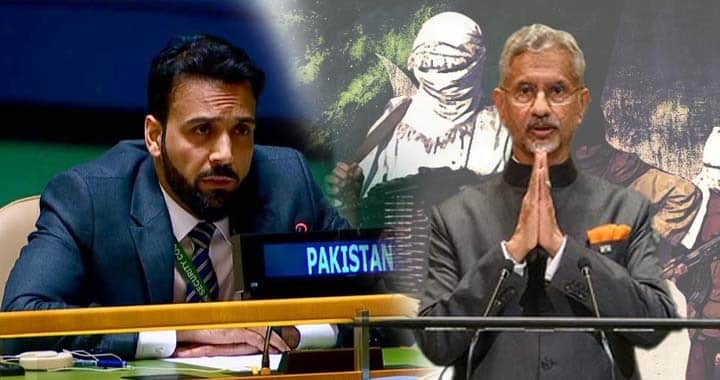Pakistan delivered a forceful rebuttal at the UN General Assembly to remarks made earlier by Indian Foreign Affairs Minister S. Jaishankar, accusing New Delhi of sponsoring terrorism and committing widespread human-rights violations in Jammu and Kashmir.
Responding on the Assembly floor, Pakistani Second Secretary Mohammad Rashid said India had once again attempted “a failed smear campaign” by levelling baseless accusations of terrorism against Pakistan. He stressed that the international community recognizes Pakistan’s own heavy toll in fighting extremism, citing more than 90,000 casualties over two decades of counter-terrorism operations.
Rashid charged that India “nurtures terrorists, fuels hatred and division in the region, and runs a cross-border network of violent proxies” that stage attacks inside Pakistan. He pointed to the 2016 arrest of Indian naval officer and intelligence operative Commander Kulbhushan Jadhav as “living proof” of India’s covert operations.
Rejecting Jaishankar’s remarks as a “recycled litany of falsehoods,” Rashid said New Delhi is among the states that “illegally occupy territory and trample fundamental rights,” calling Indian-administered Jammu and Kashmir “the most glaring example,” where he alleged daily extrajudicial killings, arbitrary detentions, and collective punishment masked as counter-terrorism.
The Pakistani envoy also referenced the recent Pahalgam incident, dismissing India’s swift blame of Pakistan as “a scripted pattern devoid of evidence or investigation.” He said Islamabad had condemned the attack alongside other UN Security Council members and even offered an independent inquiry—an offer he claimed India rejected while providing “not a shred of proof.”
Rashid further accused India of “open aggression” between 7 and 10 May, saying cross-border strikes killed 54 Pakistani civilians, including 15 children and 13 women. Pakistan, he said, exercised its right of self-defence with “measured, targeted” responses.
Calling India’s actions a “dangerous precedent for international law,” Rashid urged the global community not to ignore “unlawful and reckless conduct” that threatens regional stability.
“Pakistan desires peace,” he concluded, noting that South Asia’s 1.9 billion people—nearly a quarter of the world’s population—deserve prosperity and stability, not intimidation and fear. Genuine progress, he added, demands sincerity, mutual respect, dialogue, and diplomacy—principles Pakistan says it upholds and India must eventually accept “if it truly seeks peace.”
It’s worthy to note that a security operation in Karak on Wednesday killed 17 militants and led to the arrest of more than six suspected fighters during an intelligence-based operation (IBO). According to Pakistan’s military media wing, the Inter-Services Public Relations (ISPR), one of those killed was a Bangladeshi national whom Pakistan described as linked to what Islamabad calls an Indian-backed proxy network associated with the proscribed Tehreek-e-Taliban Pakistan (TTP). These details were presented by the ISPR as further evidence, in Pakistan’s view, of external involvement in militancy within its borders.





